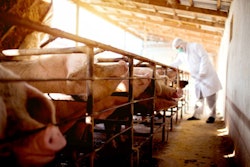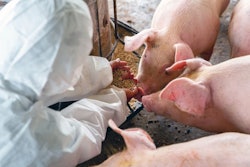
As African swine fever (ASF) continues its spread across Europe, pig farmers in nine additional countries are set to benefit from an extended awareness campaign about the potentially devastating effects of the disease on wild and domestic swine.
Germany has confirmed that a third domestic pig herd has tested positive for the African swine fever (ASF) virus. There are also new cases in Poland, Romania and Russia, and further ASF cases are reported among the wild boar populations of five European states.
To complement efforts from other bodies including the European Commission, the region’s food safety organization is extending an ASF awareness campaign to nine additional countries. According to the European Food Safety Authority (EFSA), the latest campaign will particularly target pig farmers in Bulgaria, the Czech Republic, Estonia, Hungary, Latvia, Lithuania, Poland, Romania and Slovakia.
In September 2020, EFSA launched an initial campaign to raise awareness of ASF in nine countries in southeastern Europe. These were selected as being at the greatest risk of ASF at that time.
Head of the Authority’s Animal and Plant Health Unit Nikolaus Kriz said that these previous actions were well received.
“Now we are going further afield with our message to detect, prevent and report,” he said.
As well as farmers, the campaign will help to develop understanding about ASF in groups and individuals who have contact with domestic pigs and/or wild boar. Also providing assistance in the EFSA campaigns will be local veterinarians, farming groups, hunters’ associations and border police.
Detection, prevention and reporting are essential elements if the devastating disease is to be brought under control in Europe, according to EFSA.
Third ASF outbreak in domestic pigs in Germany
ASF virus was first detected in wild boar in Germany in September last year. Since then, its spread had been confined to wild boar in the eastern states of Brandenburg and Saxony.
Last week, the national veterinary agency, the Friedrich-Loeffler Institute (FLI) confirmed the country’s first cases of ASF had been found in domestic pigs. These occurred in Brandenburg — at an organic farm with 200 pigs in the Spree-Neisse district where one sow died, and at a smallholding in Märkisch-Oderland with two pigs. Tests carried out on July 15 were positive for the ASF virus.
Two days later came confirmation of a further outbreak. This was in a small pig herd in Märkisch-Oderland. Two pigs there died, and the remaining two have been culled, according to the Brandenburg state authorities.
Source of the infection is uncertain, according to Germany’s federal agriculture ministry. However, the most likely source is contact with infected wild boar. With many cases of ASF in the wild population in the state over the past 10 months — including in these two districts — the risk of transmission would be high, particularly for free-range pig herds.
After an assessment of the situation by FLI, the local and federal authorities are urge all owners of domestic pigs to maintain the highest possible levels of biosecurity. For those in ASF-affected areas, it is recommended that their animals are confined in houses.
Poland, Romania, Russia register new cases in pigs
So far this year, Poland has confirmed 24 outbreaks of ASF in domestic pigs. The number of animals directly impacted now stands at more than 27,000, according to the nation’s chief veterinary office. The latest outbreaks were confirmed on July 13-14, and included one farm with over 2,000 pigs as well as three smaller herds of 18-153 pigs.
Also noteworthy is they include first outbreaks of this year in Lesser Poland (Malopolskie) and Mazovia — provinces located in the south and central-east of the country, respectively. Lesser Poland was not previously covered by ASF restrictions. So far this year, ASF has affected Polish pigs in 10 of Poland’s 16 provinces.
Continuing a recent surge in ASF cases, Russia’s veterinary authority has officially registered the first cases in domestic pigs of 2021 in two more oblasts. According to the latest reports to the World Organisation for Animal Health (OIE), these include the first ever case of ASF in Kostroma, and the return of the infection after 12 months to Smolensk. Both belong to the Central federal district. Affected were a single animal, and a herd of 11 pigs, respectively.
In Russia’s Northwestern federal district, three further ASF outbreaks have been registered with the OIE in Pskov oblast. In the first week of this month, the virus was detected at a farm with almost 35,000 in the Porkhovsky district, as well as in two small backyard herds elsewhere in the oblast.
Between the end of June and July 7, two outbreaks of ASF in pigs were registered in the oblast of Bryansk with the OIE. These involved a total of six animals. In the past week, the Russian authorities have declared this disease situation “resolved.”
Romania’s long-standing battle to control ASF continues with 34 new outbreaks reported to the OIE over the past week. Widely distributed across the country, these outbreaks affected herds of up to 200 pigs although the majority comprised just a few animals. At one location, five pig carcasses found discarded in a public place were also found to be infected with the ASF virus.
Further ASF infections in wild boar in 5 countries
Total cases of ASF among wild boar in Germany reached 1,608 animals, as of July 19. Based on information from the respective administrations of the two states affected so far, this represents a rise of 60 cases over the past week.
Since the eastern state registered its first case of ASF in September 2020, the agriculture ministry of Brandenburg gives its total as 1,295 confirmed cases. With ASF virus-positive cases detected in five districts, Oder-Spree has been worst affected (687 cases).
Neighboring Saxony is the only other state in Germany where ASF-positive cases have been detected among wild boar. By July 19, its total had reached 313 cases, reported the agriculture ministry. All infected cases so far have been found in the district of Görlitz.
Latest update from Poland’s chief veterinary office includes confirmation of 74 new ASF outbreaks affecting 82 wild boar. Total outbreaks in the nation’s wild animals so far this year now stands at 1,830.
Registering new outbreaks with the OIE over the past week have been Romania (12 new outbreaks), Latvia (seven) and Russia (three).
View our continuing coverage of the global African swine fever situation.
















